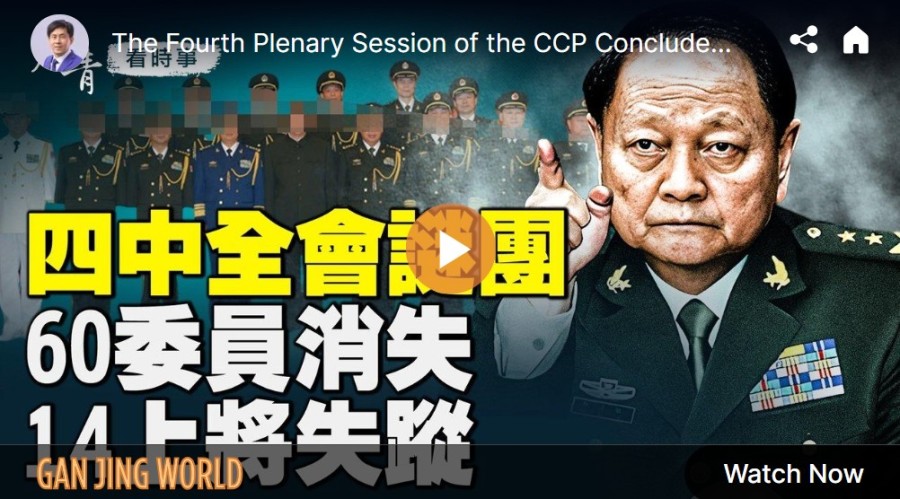The CCP Fourth Plenary Session
[People News] On November 1, the 14th meeting of the Standing Committee of the Chinese People’s Political Consultative Conference (CPPCC) concluded. In one sweep, the meeting handled the positions of 11 senior CPPCC officials:
Zhang Junkuo was removed from his position as Deputy Director of the Proposal Committee;
Yi Gang was dismissed as Deputy Director of the Economic Committee;
Zhang Taolin was dismissed as Deputy Director of the Agriculture and Rural Affairs Committee;
Zhang Jie and Cao Weixing were removed as Deputy Directors of the Education, Science, Health, and Sports Committee;
Chen Guoqing was dismissed as Deputy Director of the Social and Legal Affairs Committee;
Wang Rong and Chen Yuanfeng were dismissed as Deputy Directors of the Hong Kong, Macao, Taiwan, and Overseas Chinese Committee;
Sui Jun was dismissed as Deputy Director of the Foreign Affairs Committee.
In addition, the meeting approved the removal of Fu Xingguo from his position as Deputy Director of the Cultural, Historical, and Learning Committee, accepting his resignation as a member; and ratified the decision to remove Yi Huiman from his position as Resident Deputy Director of the Economic Committee and to revoke his CPPCC membership.
Among these 11 senior officials, Yi Huiman, Yi Gang, and Wang Rong hold full ministerial rank, while Yi Gang, Wang Rong, Zhang Taolin, Zhang Jie, and Cao Weixing are CPPCC Standing Committee members. For the CPPCC to simultaneously announce the dismissal of nine high officials and the removal of two others is “unprecedented.” Following the recent purges in the military and among senior officials in Hubei and Hunan, this further indicates a sweeping cleanup of disloyal or dissenting figures in the upper echelons of Zhongnanhai — or perhaps the digging out of a “tiger king” to pave the way for personnel arrangements at the 21st Party Congress.
The 67-year-old Yi Gang served in the CCP’s central bank for many years, including as its governor, and later as president of the China Society for Finance and Banking. In July 2023, Yi was dismissed from his posts as governor and deputy party secretary of the central bank. He was a delegate to the CCP’s 20th National Congress, an alternate member of the 19th Central Committee, and a member of the 12th and 14th CPPCC National Committees.
Yi Gang ultimately failed to advance to full Central Committee membership, reportedly because of his “sea turtle” (overseas-educated) background and his son’s refusal to return from the United States. From 1980 to 1986 he studied business administration and economics in the United States, earning a Ph.D. in economics from the University of Illinois; from 1986 to 1994 he was assistant and later associate professor at Indiana University, gaining tenure in 1992. Because of this overseas experience, delegates at the 19th Party Congress reportedly voted him out of a Central Committee seat.
Yi Huiman, former chairman of the China Securities Regulatory Commission (CSRC), was arrested on September 6 this year. The CSRC—critical to the regime’s economic and stock-market control—has long been “cursed”: top leaders there are high-risk figures. Yi’s two predecessors, Xiao Gang and Liu Shiyu, both lost their posts amid scandals while in office.
On November 3, the CCP announced that Wang Jianjun, former vice-chairman of the CSRC, had been “double-expelled” (from the Party and public office) and placed under investigation. In the past decade, others to fall include:
-
Zhang Yujun, former assistant chairman of the CSRC;
-
Yao Gang, former vice-chairman;
-
Yang Chunlei, former deputy director of the CSRC Discipline Inspection Office;
-
Wang Huimin, former head of the CCDI’s supervision group stationed at the CSRC;
-
Yao Qian, former director of the Technology Supervision Department;
-
Li Xiaoqiang, former deputy director of the Issuance Supervision Department;
-
Wu Guofang, former deputy director of the Legal Department.
Yi Huiman was inevitably entangled with these successive fallen senior officials. In other words, Xi’s CCP will not spare the CSRC leadership when it comes to consolidating control over the stock market and the economy—to prevent another “stock market revolution” like that of 2015–2016, which nearly toppled Xi’s regime.
Another odd dismissal was Fu Xingguo. A 19th-Central-Committee alternate member, he had served more than a decade as a vice-minister but never achieved full ministerial rank, eventually being sidelined to a second-tier post—and now even losing his CPPCC seat. The CCP gave no clear reason for his or the others’ dismissals.
However, judging from their backgrounds, two categories of officials seem distrusted by the Party:
-
Those with overseas backgrounds—viewed as potential security risks or leaks of secrets. In the CCP’s eyes, no senior official is fully trustworthy; all are “two-faced.”
-
Those with real influence in economic or financial fields—a sector now under extreme stress as the Chinese economy nears collapse, government finances dry up, and public resentment surges. If these figures fail to show “firm loyalty” and “confidence in Xi’s leadership,” trouble could arise at any time.
Analysts believe that with the 21st Party Congress only two years away—where the question of Xi’s continued rule will be decided—the regime must now pre-purge the top ranks to ensure “purity.” Thus, the mass dismissal of 11 senior officials may mirror the earlier removal of nine generals before the Fourth Plenum: a show of force to enforce ideological unity and to intimidate the “iron-capped princes.” The message is clear: “We’re trimming your skirts now—if anyone stands in the way of the 21st Congress, don’t blame us for blowing up the rocks to clear the road. Don’t be surprised when we go after the Tiger King.”
(People News exclusive) △











News magazine bootstrap themes!
I like this themes, fast loading and look profesional
Thank you Carlos!
You're welcome!
Please support me with give positive rating!
Yes Sure!